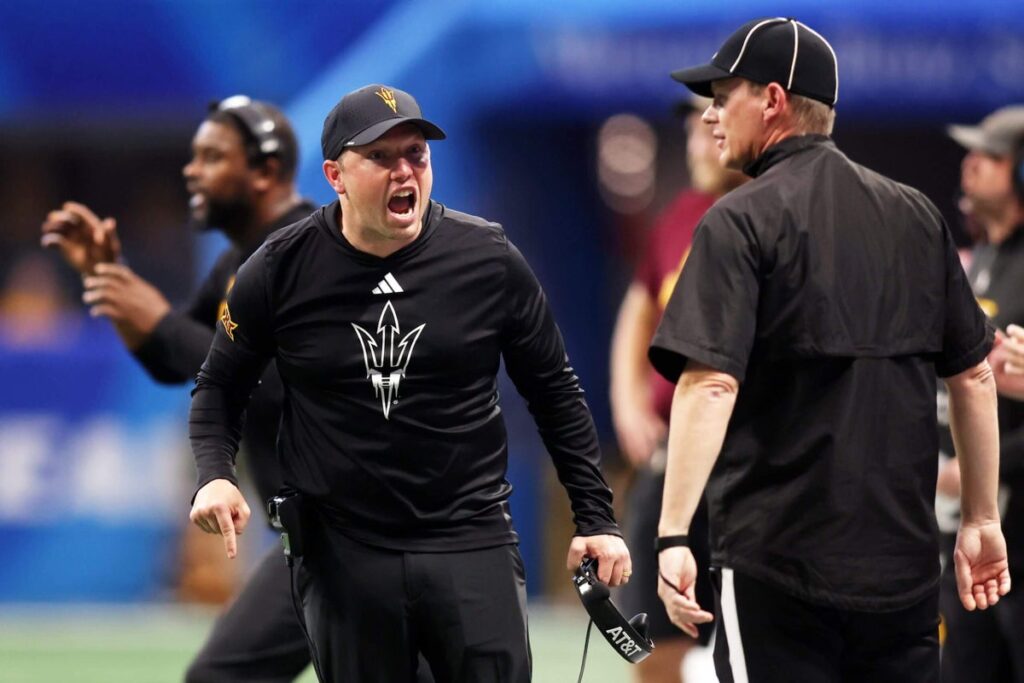[ad_1]
College Football Playoff executive director Rich Clark defended the Peach Bowl officiating crew and called its processes “appropriate and proper” after Texas’ thrilling 39-31 double-overtime win against Arizona State in the College Football Playoff quarterfinals nearly turned twice on potential targeting penalties that were ultimately not called after review. The second ruling led the Big 12’s commissioner to call for an address of CFP officiating.
“The rules and everything the officials are supposed to go by was appropriate and proper,” Clark said Thursday. “Ultimately, it came down to a judgment call and it was a tough call to make. Like anything that’s a judgment in the gray area, some people will see it one way and some see it another. But we have to let the officials do their jobs and use their judgment.”
Targeting has been college football’s most controversial rule since it was implemented in 2008, in part because it’s a 15-yard penalty with an ejection, and also because fans and commentators still can’t quite define what it is.
In the first situation in Wednesday’s game, Arizona State’s Javan Robinson intercepted a deep pass with 5:45 to play just as another Arizona State defender delivered a hit on Texas receiver Isaiah Bond, whose head swung back on contact. Officials reviewed the play and determined there was no targeting, allowing the interception to stand. Arizona State tied the game with a touchdown on the ensuing drive.
With 1:15 left and the score still tied, Arizona State completed a 10-yard pass to receiver Melquan Stovall at midfield on third-and-15. Texas defensive back Michael Taaffe made the stop on Stovall, and both helmets collided on the hit. That play was also reviewed for targeting, but no penalty was called, which upset Arizona State head coach Kenny Dillingham.
No targeting on Texas here 👀 pic.twitter.com/3BkmiD73MM
— FOX College Football (@CFBONFOX) January 1, 2025
“In terms of targeting, I’m going to be honest: I don’t know what targeting is,” Dillingham said after the game. “… But I do want to protect the players, so whatever rules that protect the players, I’m all about.”
Targeting is defined as either a forcible hit with the crown of the defender’s helmet, or a forcible hit (with any part of the body) in the head or neck area of a defenseless player.
Former NFL official and current NBC rules analyst Terry McAulay tweeted that he thought Texas’ hit was targeting because of a defenseless player:
To be clear:
1. He took aim at an opponent for purposes
of attacking with forcible contact that goes beyond making a legal tackle or a legal block or playing the ball.
2. He led with his head.
3. He made forcible contact to the head/neck area of a defenseless receiver using his… https://t.co/oEAot8DGB8— Terry McAulay (@tjmcaulay) January 1, 2025
A penalty would have extended the drive and given Arizona State a chance to play for the win. It was forced to punt, though Texas subsequently missed what would have been a winning field goal as time expired, sending the game to overtime. There, the Longhorns threw a touchdown on fourth-and-13 to tie the score in the first overtime, then won in the second OT period.
The day after the game, Big 12 commissioner Brett Yormark called for a review of CFP officiating and national standards. The Peach Bowl had Big Ten referees.
“I’m incredibly proud of how Arizona State represented the Big 12 in the CFP quarterfinals,” Yormark said in a statement. “As a member of the College Football Playoff management committee, I have had multiple discussions seeking clarity surrounding the targeting call on Arizona State’s final drive of the fourth quarter with (CFP executive director) Richard Clark.
“Moving forward, we need to address CFP officiating to ensure national standards are developed. These standards will be crucial to the CFP’s future, and I look forward to discussing them with my fellow committee members when we meet next.”
Clark noted the crews that work College Football Playoff games are the highest-rated officials from their respective conferences, and that the CFP determines which conferences officiate which games.
“At the end of the season, we’re going to look at everything, the commissioners on the management committee, we’ll review all aspects and we’ll just have to see where they go with that,” Clark said. “I’m not ready to get out in front of that.”
Required reading
(Photo: Brett Davis / Imagn Images)
[ad_2]
Source link

